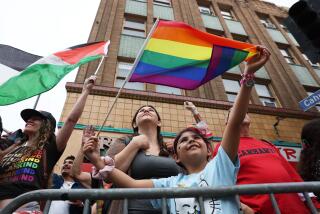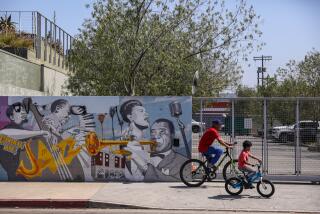1 Million and Counting : Historic March Brings Renewed Activism Among Blacks in L.A.
- Share via
Larry Townsend was on vacation, in the lounge of a Toronto hotel, glued to a big-screen television set, amazed at the sea of humanity gathered in Washington for the Million Man March.
Suddenly, the retired Los Angeles police detective felt out of place; he yearned to be among the hundreds of thousands of African American males dedicating themselves to redeeming black neighborhoods.
After he returned home, Townsend placed a call to Big Brothers of Greater Los Angeles, volunteering to become a companion to one of the hundreds of black boys on the organization’s waiting list.
He is not alone. A month after the Oct. 16 march, black community leaders and social service organizations are reporting a renewed sense of activism inspired by the historic event.
The ripples are evidenced by men showing up to help out with Little League baseball and Pop Warner football, volunteers seeking to register new voters and providing assistance to the homeless and unemployed. Townsend, 51, said that in the hours he watched the march, “I decided then and there that it was time for me to give something back to my community. When I saw all the energy in Washington, I realized that it was time to stop procrastinating and make a contribution.”
More than 150 African American men have signed up to become Big Brothers at two Los Angeles community rallies in the past four weeks, a spokesman for the organization said. That is about four times the usual number.
The flood surprised the organization’s recruiters, who were just beginning a major push to sign up African American men. In the past they had offered premiums such as tickets to athletic events to attract volunteers, but none were needed after the march.
Local offices of the National Assn. for the Advancement of Colored People and the Urban League--two major organizations that did not endorse the march, in part because of the role of Nation of Islam leader Louis Farrakhan--have benefited nonetheless from enthusiasm the event generated.
Less than 24 hours after the march, Los Angeles Urban League offices got more than a dozen calls from people seeking ways to volunteer. At least 100 requests for new memberships have come in to the Los Angeles NAACP office, and scores of inactive members have resurfaced, chapter President Geraldine Washington said.
“We have seen this all coming from the march,” she said.
Minister Tony Muhammad, Farrakhan’s western regional representative, said a long-dormant energy has been awakened in the black community.
More than 300 families have signed up to adopt children, he said, and volunteers at march headquarters in the Crenshaw district have registered about 3,000 new voters. Those new voters are among more than 10,000 who have registered in County Supervisor Yvonne Brathwaite Burke’s 2nd District, which includes much of South-Central Los Angeles, during the past two months.
“We don’t want to reinvent the wheel,” Muhammad said. “So many people in organizations were burned out, but they are now getting themselves back in motion. We want to connect the community with the programs that are already working.”
Watts fifth-grade teacher John Hamilton, who attended the march, says he has seen the school’s neighborhood benefit from post-march enthusiasm.
The three men who volunteered for a mentoring program he runs at 112th Street Elementary School have been joined by seven more, and Hamilton saw the half-dozen families that turned out for a Pop Warner football team he helped organize earlier this year swell to more than two dozen.
“This is the first Pop Warner program we’ve had in this community,” said Hamilton.
The spirit was on display within two weeks of the march when 2,000 people from 50 nonprofit African American groups held a rally in the Crenshaw district and signed up hundreds of volunteers. A similar rally is scheduled for 3 p.m. Saturday at the Vision Theater on 43rd Street in Leimert Park.
Harnessing the energy generated by the march has not been easy for all groups, as Ken Riley learned. Riley, 35, is president of the newly formed Los Angeles chapter of MAD DADS, an organization of fathers seeking to take back communities from criminals. He gathered more than 200 names of prospective members, but fewer than a dozen people showed up for the first meeting earlier this month.
Riley said the turnout resulted from poor communication.
“I knew this was going to be a long struggle,” he said. “The enthusiasm is there, but we still have a lot of work left to do.”
First African Methodist Episcopal Church, which sent nearly 100 members to the march, has encouraged members to open accounts in black-owned banks and to support a day in February when professionals will take African American boys to their jobs.
The church also held a dialogue last week with members of Temple Isaiah, a Jewish synagogue, who had raised concerns about Farrakhan’s involvement in the march and about celebrations in the black community after the O.J. Simpson verdicts.
“There were some wounds we wanted to heal, so we decided to talk about it,” said First AME official Mark Whitlock.
“People just wanted to talk honestly about their concerns, share their feelings and continue the relationship,” said Temple Isaiah’s Rabbi Robert Gan. “All of us want something positive to come out of this.”
For Big Brother applicant Townsend, who retired from the LAPD in 1993, the march was a signal that it was now time for him to put his name “on the dotted line.”
“As a cop you are always on the sidelines watching as things unfold, sometimes tragic things,” said Townsend, who has two sons, both of whom have graduated from UCLA. “If I can touch the life of one youngster, it would make me feel extremely good.”
More to Read
Sign up for Essential California
The most important California stories and recommendations in your inbox every morning.
You may occasionally receive promotional content from the Los Angeles Times.













